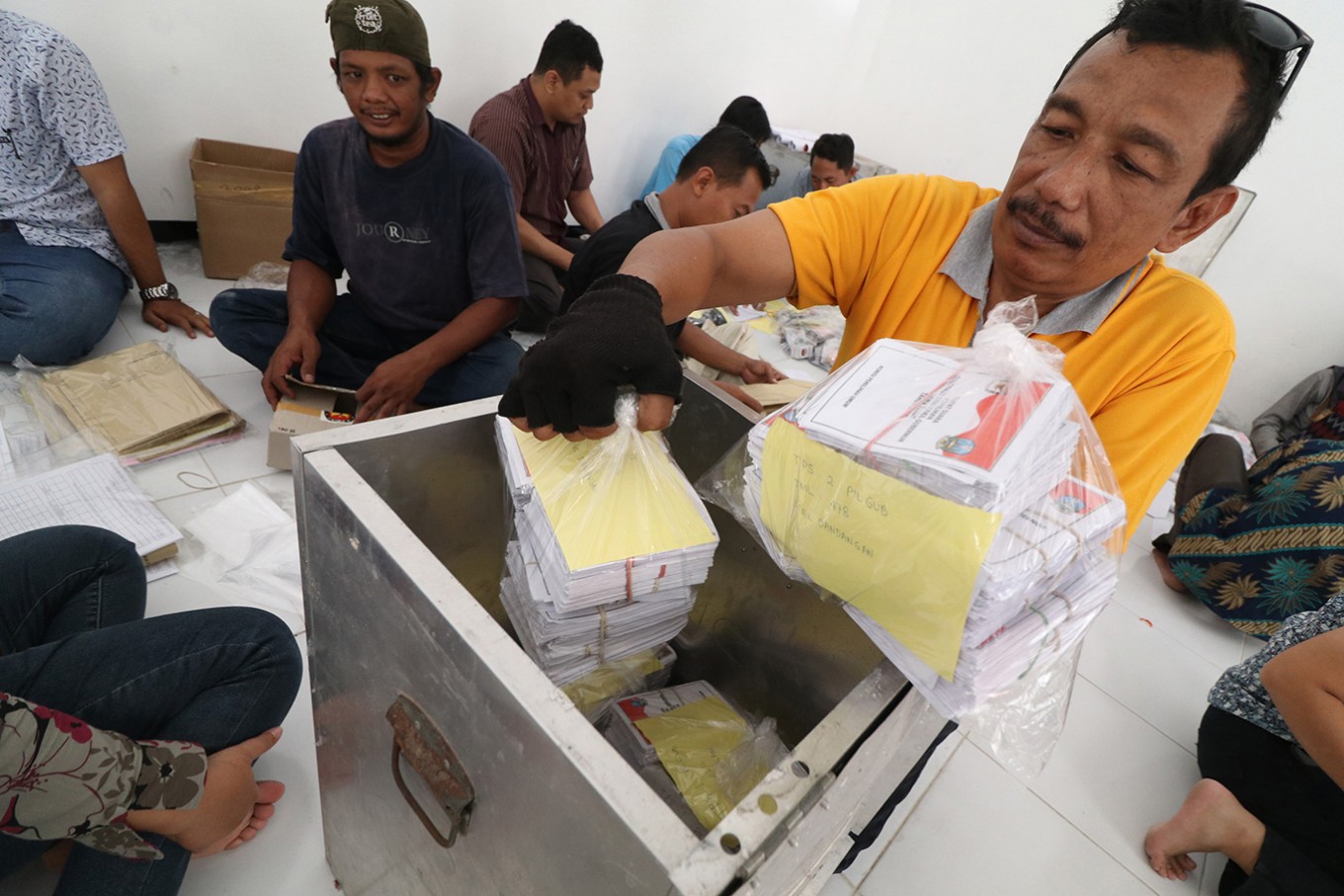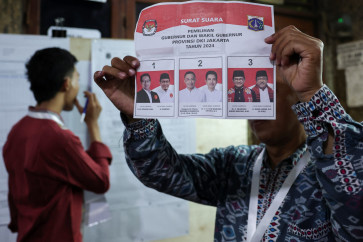Popular Reads
Top Results
Can't find what you're looking for?
View all search resultsPopular Reads
Top Results
Can't find what you're looking for?
View all search resultsHanindhito runs against himself for Kediri regent
The controversies surrounding the Kediri regency election have led political and election experts to suggest that it lays bare the flaws in Indonesia’s democratic system.
Change text size
Gift Premium Articles
to Anyone
A
s 270 regions across the archipelago contest the 2020 simultaneous regional elections on Dec. 9, only a few dozen races promise a worthwhile political spectacle.
Among them is the regency election for Kediri in East Java, which not only has one but two big points of contention.
The controversies surrounding the Kediri poll have even led political and election experts to suggest that it lays bare the flaws in Indonesia’s democratic system.
Political dynasty
The Kediri election is to be contested by 28-year-old businessman Hanindhito Himawan Pramono.
With the blessing of the ruling Indonesian Democratic Party of Struggle (PDI-P), he teamed up with Dewi Maria Ulfa, the leader of the Kediri branch of Fatayat NU, the women’s wing of the largest Islamic organization in the country, Nahdlatul Ulama.
Hanindhito is gunning for the regent’s chair, which is soon to be vacated by incumbent leader Haryanti Sutrisno, who is unable to run for a third term.
Like many regions, Kediri is no stranger to political dynasties, which has long been a marker of local politics since regional autonomy was first introduced in 1974 and consolidated after the end of the New Order era.
In Indonesia, political dynasties often equate to nepotism, such as when positions of power are handed to family members or acquaintances, or when a family has so much influence that leadership itself is passed down from one family member to another. For years, experts have faulted the phenomenon for allowing oligarchies to flourish.
In Kediri’s case, incumbent Haryanti has served almost a decade in office, having taken over the top job from her husband Sutrisno, who was regent from 2000-2010.
But even as a newcomer, political experts have warned that Hanindhito’s candidacy will likely pave the way for another political dynasty to emerge in the region, given that he is the son of Cabinet Secretary Pramono Anung, a highly respected senior PDI-P politician.
The public seems to be just as fed up with them, too.
A July survey conducted by the research and development department of Kompas daily found that around 61 percent of 553 respondents did not like the idea of family members of political leaders running for regional head posts.
Around 28 percent of them regarded it as a normal practice, while another 11 percent said they failed to understand what is meant by a political dynasty.
For his part, Hanindhito conceded that many people have accused him of being motivated to set up his own dynasty.
Without addressing the issue directly, he claimed there was not one regulation in the country that prohibited the practice.
“I realize that everyone will associate my candidacy with my being Pramono’s son,” he said during a recent online discussion. “That’s why I’ve been eager to break that stigma ever since my declaration earlier this year.”
Sole candidacy
His affiliations aside, Hanindhito’s candidacy caused further public debate after the Kediri branch of the General Elections Commission (KPU) declared him the sole candidate to run in the 2020 regional election, following his ticket’s success in securing support from 12 political parties. He is being endorsed by six parties from the ruling coalition, three opposition parties and three parties that failed to secure seats at the House of Representatives.
As one of 25 sole candidates competing in this year’s elections, Hanindhito is set to go up against a “blank box”. This means that voters have the choice of either voting for him or poking through a blank space on the ballot paper to reject his candidacy.
Critics have suggested that the sole candidacy in all these regions only serves to emphasize the failure of political parties in scouting competent candidates to run for office.
They also fear that a successful one-horse race backed by the ruling big-tent coalition is more susceptible to abuse of power, which runs the gamut from embezzling regional funds to political horse-trading for positions of power.
Still likely to win
Despite these controversies, Hanindhito is tipped to secure a landslide victory, thanks in no small part to the PDI-P’s strong grip on the regency.
In last year’s presidential election, 815,833 out of the total 988,981 eligible votes from the region – roughly 82 percent – went to the eventual president-elect, Joko “Jokowi” Widodo. His opponent at the time, Gerindra Party leader Prabowo Subianto, received just 18 percent of the votes in the regency.
The ruling party also secured the largest number of seats in the Kediri Regional Council, with 15 out of the total 50 seats taken by the PDI-P, or 30 percent of all councillors.
“The strong PDI-P presence in the regency, coupled with his sole candidacy, will definitely lead people to vote for Hanindhito,” said Indonesia Political Opinion executive director Dedi Kurnia Syah.
Crucial to Hanindhito’s predicted win in Kediri is the PDI-P’s loyal voter base, which is made up of people who support every choice that their party makes, regardless of the perceived quality of the candidate, Dedi said.
Among them are voters who live outside of the urban centers – in Kediri’s case 1.23 million people – who tend to become part of the “traditional” base in any election.
The head of the PDI-P’s Kediri branch, Murdi Hantoro, said he was confident that Hanindhito could garner at least 80 percent of the vote in the upcoming election, especially with the backing of all those political parties.










